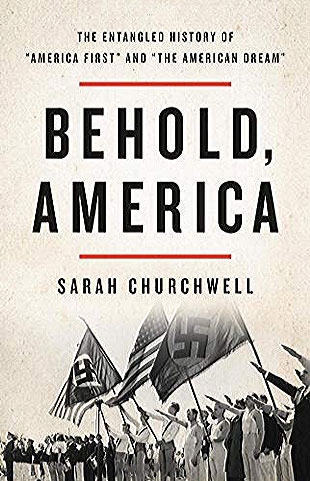"Like the Progressives thirty years before him, [historian James Truslow] Adams held that the 'American dream' required the energetic maintenance of a social order dedicated to values beyond individual affluence. Americans had been remembering the cost of everything and the value of nothing: 'size, like wealth, came to be a mere symbol of "success," and the sense of qualitative values was lost in the quantitative, the spiritual in the material.'
"Sharing the blind spots of his time, Adams saw American history in terms of the European migrations and the actions of white men, calling indigenous people 'savages,' barely noticing the presence of 'negroes,' and ignoring all but a few white women. But Adams was also describing a national ethos that had been defined by these white male European settlers. And the principles he was excavating of the dream of self-realisation applied to all, even so to the many Americans, men like him tended to forget — as those overlooked Americans were pointing out with ever increasing force.
"Much of his book The Epic America was devoted to a cultural history of 'rugged individualism,' explaining that the American dream was shaped by the brutal realities of wresting life from a wilderness, creating a national economy and ideology to support it. Early settlers got into the habit of deciding for themselves which British laws they would obey, which instilled a culture of autonomy bordering on autarchy. Throughout American history we can hear, Adams wrote, 'the stroke, stroke, stroke of an ax on trees, the crash of the falling giant — advancing woodsmen making their clearings; Democracy; "business".'
"It was in the nineteenth century, he added, that Americans began to convince themselves that the accumulation of wealth was a patriotic duty, pursued for the mutual benefit of individual and the nation, that indeed it was citizens' moral obligation to develop and build the country. The fallacy took hold. 'If the making of a hundred thousand was a moral act, the making of a million must be one of exalted virtue and patriotism,' no matter how immoral the means by which the money was made.
"Being rich had become taken for a virtue, so much so that people might one day believe a man was good merely because he was rich, rather than viewing obscene wealth as just that — obscene. Vast fortunes have always been more likely to signal moral turpitude than rectitude.
"American individualism had enabled 'an extraordinarily rapid economic exploitation and development,' but individual competition for 'dazzling prizes' was destroying 'both our private ideals and our sense of social obligation.' The wealthiest remained unconcerned about privilege, 'because privilege was to their advantage,' while the majority 'rebelled, about once a generation, against the accumulated abuses' of this radically individualist system.
"But individualism was always restored as America's 'working theory of government,' because the nation's deep resources meant that individuals continued to glimpse personal opportunities, and resented a government interfering with them.
"There was only one way, Adams held, that the American dream of equality and opportunity could become abiding reality. Trusting 'the wise paternalism of politicians or the infinite wisdom of business leaders' would never work — but Adams was not demonising the wealthy. He saw that they represented the values of their culture; by definition the ambitious strove to attain what their society taught them to respect. As long as wealth and power remained 'our soul badges of success,' they would continue to shape national aspirations, 'unless we develop some greatness in our own individual souls.'
"It was ludicrous to expect people with wealth and power to 'abandon both to become spiritual leaders of a democracy that despises spiritual things.' By the same token no politician would ever 'rise higher than the source of his power.' There was no point in looking to leaders, therefore, 'until countless men and women have decided in their own hearts, through experience and perhaps disillusion, what is a genuinely satisfying life, a "good life" in the old Greek sense.'
"This genealogy of America's value system made The Epic America a bestseller. Adam's ideas were welcome to a nation that was trying to survive a crisis by changing its rules; a renewed sense of mutual obligation and commonweal, in the old sense of common well-being, rather than commonwealth, seemed the obvious answer to many, an ethos that they used the 'American dream' to indicate. Economic and moral failures were intertwined, they concluded, and set about restoring the nation's moral economy.
"Selfishness had failed, spectacularly. It was time to focus on the greater good."
